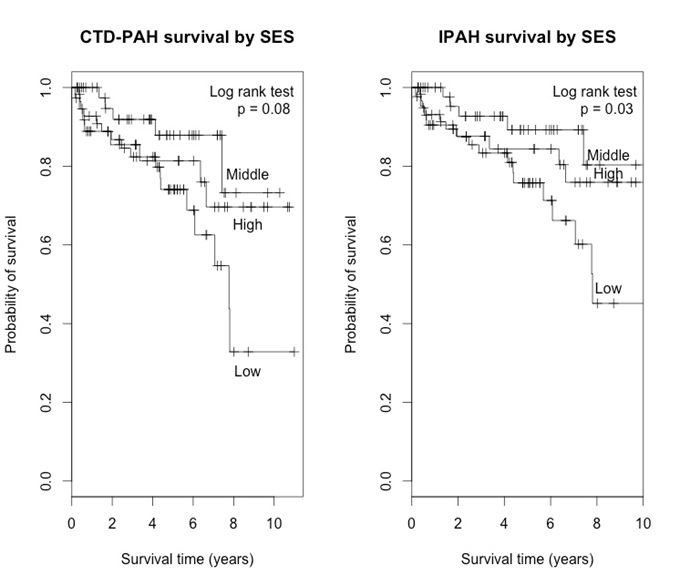Session Information
Date: Monday, November 9, 2015
Title: Systemic Sclerosis, Fibrosing Syndromes and Raynaud's - Clinical Aspects and Therapeutics Poster II
Session Type: ACR Poster Session B
Session Time: 9:00AM-11:00AM
Background/Purpose: Poorer health outcomes for persons with chronic diseases have been reported in association with lower socioeconomic status (SES). No such evaluation exists for patients with connective tissue disease associated pulmonary arterial hypertension (CTD-PAH). We evaluated the impact of SES on survival of patients with CTD-PAH and idiopathic PAH (IPAH).
Methods: A retrospective cohort study of patients attending the University Health Network Pulmonary Hypertension Programme and the Toronto Scleroderma Program was conducted. Using postal codes and census information for median household income, SES (low, middle, high) was assigned to each individual. Kaplan Meier curves were used to compare survival in different SES groups.
Results: 600 patients (n=445 CTD, n=155 IPAH) were identified. There were 209 deaths (n=177 CTD, n=32 IPAH). CTD-PAH patients stratified by SES had 5-year survival of 81.4% (95%CI 68.7%, 96.3%) for high SES, 87.9% (95%CI 77.2%, 100%) for middle SES and 74.1% (95%CI 62.2%, 88.3%) for low SES. IPAH patients stratified by SES had 5-year survival of 84.4% (95%CI 73.5%, 96.9%) for high SES, 89.2% (95%CI 79.7%, 100%) for middle SES and 75.7% (95%CI 64.4%, 89.0%) for low SES. IPAH patients with low SES had worse survival (log rank test p=0.03), and CTD-PAH patients had similar findings that bordered on statistical significance (log rank test p=0.08).
Conclusion: Socioeconomic inequalities appear to impact survival. Further research is required to understand the underlying basis for these findings including differences in disease severity, proximity to a hospital and effect of moving from one SES region to another.
To cite this abstract in AMA style:
Jin H, Granton JT, Thenganatt J, Moric J, Gupta A, Kron AT, Chau C, Johnson SR. Impact of Socioeconomic Status on Survival in Connective Tissue Disease Associated and Idiopathic Pulmonary Arterial Hypertension [abstract]. Arthritis Rheumatol. 2015; 67 (suppl 10). https://acrabstracts.org/abstract/impact-of-socioeconomic-status-on-survival-in-connective-tissue-disease-associated-and-idiopathic-pulmonary-arterial-hypertension/. Accessed .« Back to 2015 ACR/ARHP Annual Meeting
ACR Meeting Abstracts - https://acrabstracts.org/abstract/impact-of-socioeconomic-status-on-survival-in-connective-tissue-disease-associated-and-idiopathic-pulmonary-arterial-hypertension/

